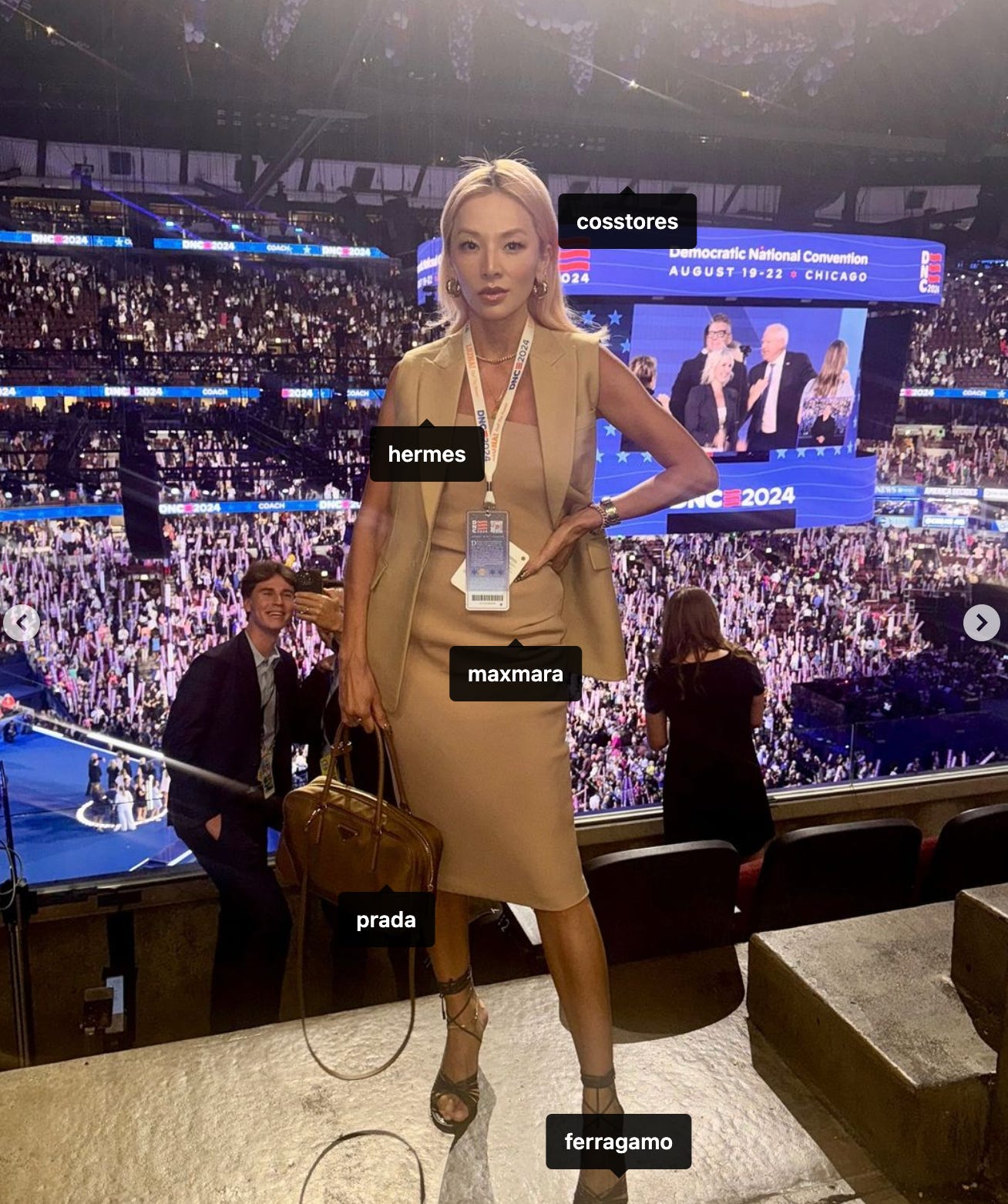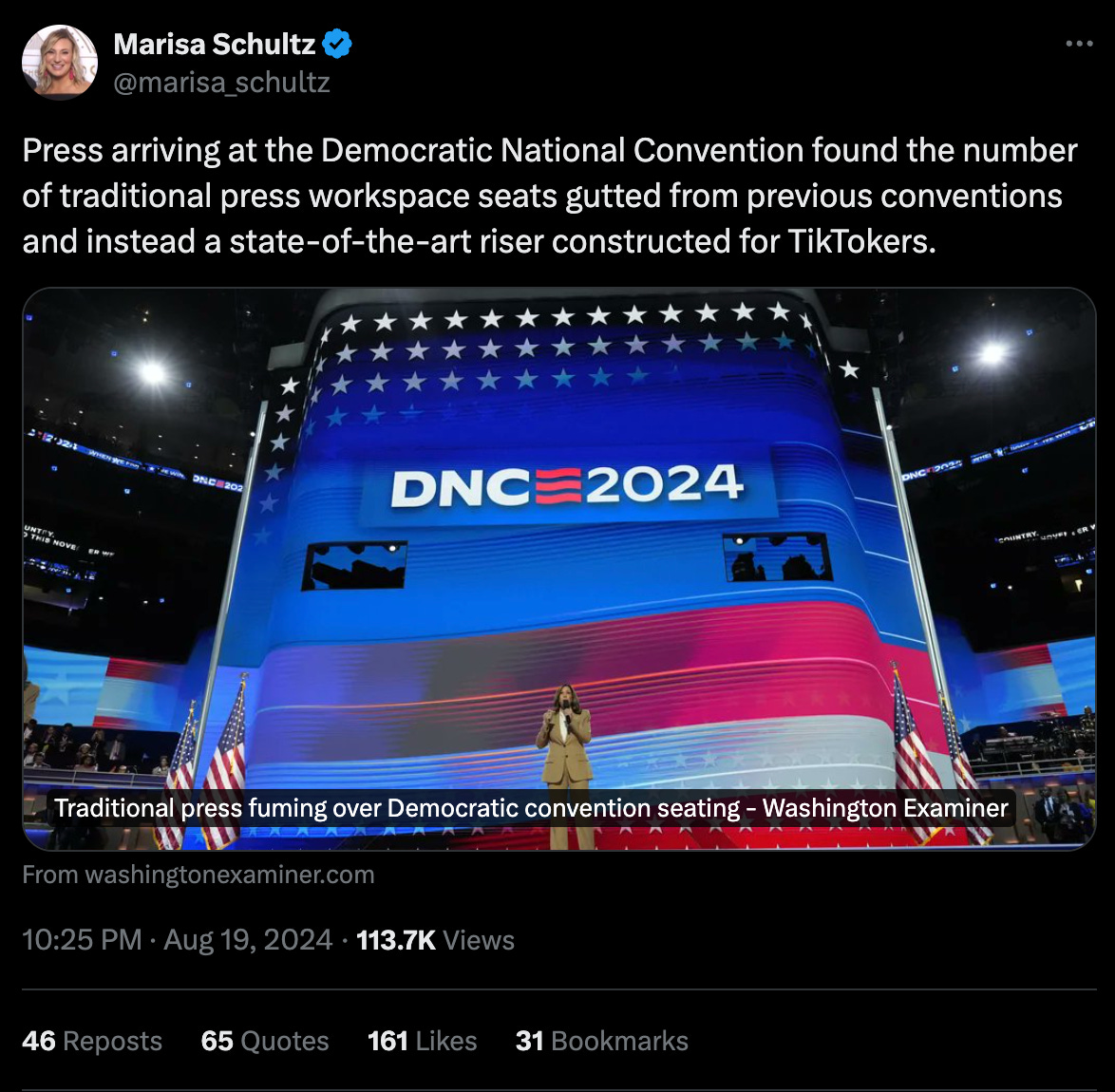Influencers spread political vibes, not journalism, this summer
While content creators raised awareness, they didn't do much for anyone's IQ

I’m back. Beach vacation behind me, the school year underway for my 8th grader, Thanksgiving cards already in stores (WTF!?). Summer feels like a fever nightmare turned dream (it was A SUMMER) that is already in the rearview mirror.
Now that I’m back, big thanks to everyone who sent me links and quotes from two creator-centric August stories about official places where creators aren’t just showing up, but actively invited: The White House and the political conventions.
This is an important story, though, not because doors were opened to non-traditional journalists (they weren’t really), but because politicians are unsurprisingly seeing influencers as a fast track to reaching new audiences, often with complimentary and non-critical amplifications of their own agendas.
This is an important distinction because although it was fun to see Tina Leung rocking cute ‘fits around the convention center, the impetus behind their sudden inclusion in official events is not the First Amendment. It’s marketing. The RNC, DNC and White House courted influencers to vie for attention this summer and it worked. An increase in engagement with political content is net good, especially when it comes to getting out the vote. The risk, though, is that the audience will see what Tina, and others, post as credible news when what it really is is complementary and non-critical amplifications of the parties, or candidates, own agendas.
Many of the 15,000 journalists who were on-site pointed this out:
“When you’re getting a TikTok from an influencer about what’s happening at the DNC, that is not objective, that is a subjective person, putting on a very specific spin,” The New Republic’s Grace Segers told Politico. “And you can argue that the media has its own spin, but journalists care about fact-checking. We care about making sure that something is accurate. And you can’t say the same about most quote, unquote content creators.”
"No one's replacing anybody," Harris campaign digital strategist Rob Flaherty told Reuters. "But here's the thing, like voters consume information from more places than ever."
Even the President, addressing the creators at The White House, characterized them as the future of news:
“You’re the source of the news,” said Biden. “You are the new possibilities. You are the new breakthrough in how we communicate.”
True in that this is a nice new rich vein of brand-safe and like-minded message amplification for politicians and campaigns. True in that many who encounter partisan, or paid for, influencer content in their feeds will see this as news.
More precisely, influencers that the White House are courting are the future of the information war, the attention war. The sheer ubiquity, stickiness and virality of influencer content is pushing credible news, and news sources, to the side.
As independent journalism creators, and those of us who care deeply about fostering these journalists, we need to think about how to both differentiate and define rigorous work, both to the audience and to folks in press offices credentialing the next generation of news sources.
A similar argument popped up in the Aughts around bloggers (I was on the front lines of the blogger vs. real journo war at The Washington Post) as audiences gravitated to the more casual, accessible and personality-forward blogs over stodgy news stories. As Politico’s Calder McHugh astutely points out, though, one of those bloggers who was derided as a sideshow then is now one of the most influential voices of political journalism: Ezra Klein.
Still, influencers aren’t journalists in the same way Ezra, Chris Cillizza, me and other early bloggers already were. We took principles learned in J School and newsrooms and used them to do things in a new way. Todays influencers are, by and large, vibe monsters chasing algorithms and clicks. It’s difficult to imagine they’re gravitating to election content because of an abiding love of democracy or policy reform. Rather, this is what is feeding the beast this week, month, quarter. We should be wary of those intentions.
I’d appreciate your thoughts about this moment and how to ensure independent creator journalism distinguishes itself in the tidal wave of creator content flooding our “news” landscape. Chime in below in the comments or drop me a line at liz@projectCcollective.com.
📣 Headed to ONA in September? I’ll be co-leading a Saturday morning workshop with Nieman Fellow/digital news hotshot Ryan Kellett, engagement strategy and fundraising strategy queen Blair Hickman and one of my fave indie newsletter scribes, Caitlin Dewey. To apply, fill out this form to tell us why you’re interested. (Browse the full schedule)





